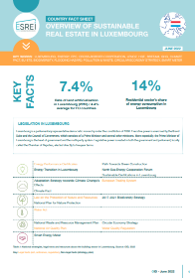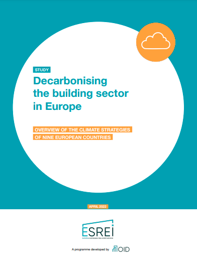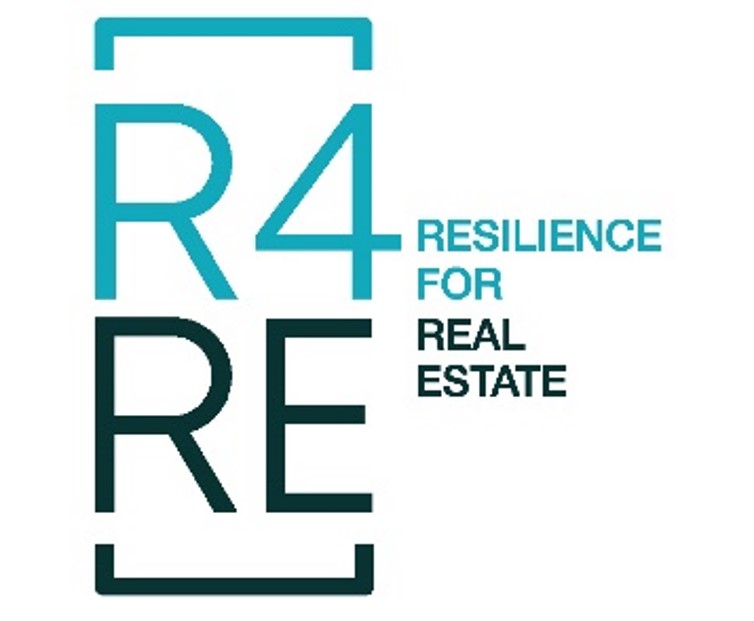The Green Building Observatory (the OID in French) launched a European programme in 2021, the European Sustainable Real Estate Initiative (ESREI). This OID sponsored programme brings together real estate stakeholders to discuss ESG issues and the situation regarding ESG regulations across Europe.
After just one year of existence, and thanks to the support of the 11 sponsors – to date – of the programme, ESREI has published several studies and tools, as well as a series of country fact sheets. Here are a short summary of the resources put at public disposal so far.
The need for a European perspective
Created in 2012, the OID is an independent association and public interest entity that brings professionals from the public and private property sector together. It is a space for exchanging ideas and sharing testimonials to widen access to the best sustainable property practices. Every year, the OID publishes a Barometer of energy and environmental performance in France, as well as a Barometer of Sustainable Property.
For several years, the OID has worked on and published many regulations at both a French and European level, with the European Taxonomy. However, as European regulations are multiplying, the need for a European vision is now essential. Therefore, the OID took the leap in 2021 and launched a programme called European Sustainable Real Estate Initiative (ESREI). As of today, 11 sponsors support ESREI.
The first achievements of ESREI
Among various projects, the OID has published 8 country fact sheets designed to lay out overviews of the sustainable real estate sector in each of the area studied. A strong focus on applicable regulations framework is also included. Germany, the United Kingdom, Italy and the Netherlands have already been covered. Coming soon are the fact sheets on Ireland, Denmark or Austria.

Furthermore, two pan-European studies have already been conducted. The first on “Decarbonising the building sector in Europe” and the second on “Comparing European EPCs for energy transition in buildings”. These publications shed light on the gap between the common objective set out at European level and the national features of the transposing regulations in each country. In the coming years, harmonisation between European countries will be key to ensure the success of the continent-wide ecological transition.

Lastly, the programme has produced a completed and improved version of Bat-ADAPT, OID’s physical climate risk analysis tool for buildings, launched in 2020. This improvement includes an extension of climatic hazards to the European perimeter, based on data from IPCC models. This latest version of Bat-ADAPT is integrated into a new resilience analysis platform: Resilience for Real Estate – R4RE. Beyond climate resilience of the buildings, the R4RE platform will also explore biodiversity, and other territorial stakes to come.

What’s to come in the next year?
Benchmark of European buildings energy data – Within the context of the climate mitigation criteria of the European Taxonomy, a lot of real estate actors are expressing the need to have a European benchmark. For this reason, the OID is extending the perimeter of its Barometer of energy and environmental performance to other countries this year, namely Germany, the UK and the Netherlands. All the data collected will be consolidated to publish indicators on real energy and the environmental performance of the office buildings in these countries.
All actors willing to contribute to this project can contact us at esrei@o-immobilierdurable.fr.
New country fact sheets – As during this first year, we will continue to document how our European neighbours approach ESG issues for the real estate sector. All stakeholders will collectively benefit from learning best practices of other countries. Coming soon are the fact sheets about Ireland, Denmark or Austria.
A focus on residential and office EPCs – After the release of the first volume of our three-fold publication on European EPCs, the second part will focus on the residential situation whilst the third part will analyse the case of office buildings. The question of harmonising EPCs is key in the context of the European Taxonomy.
The release of other pan-European studies – Apart from the EPC publications, a programme of pan-European studies will be discussed with the ESREI sponsors, to explore further regulation and ESG issues throughout Europe.
An enhanced tool to improve the R4RE-tool – In line with the work already carried out by the OID, the Bat-ADAPT tool will be continuously improved and enhanced throughout the year. The objective is to meet the needs of the actors as well as to anticipate upcoming regulations – such as the climate adaptation criteria of the European Taxonomy.
A strengthened European network – Identifying partners throughout Europe is also a strong goal for the programme. Creating a network working together on ESG issues for real estate will strongly help the transition towards more sustainable real estate.
All tools and publications are put at the disposal of the public, in line with the OID’s identity as a public interest entity.
After just one year, we are proud of what has been achieved so far thanks to the support of our sponsors. Taxonomy indicators and benchmarks, EPCs harmonisation, NZEB throughout Europe, decarbonisation strategies: here are a few of the subjects addressed. We strongly think that the programme is useful to the sector and that upcoming regulations will make it even more essential. The initiative is still open to new sponsors: join us to help us go further and faster!
ESREI contact: esrei@o-immobilierdurable.fr.

The ESREI programme is now sponsored by Advenis REIM, AEW, Allianz Real Estate, Amundi Asset Management, Aviva Investors France, BNP Paribas Real Estate, CBRE, Icade, La Française REM and PERIAL Asset Management. Launched mid-2021, the programme will have a minimum duration of 2 years.


